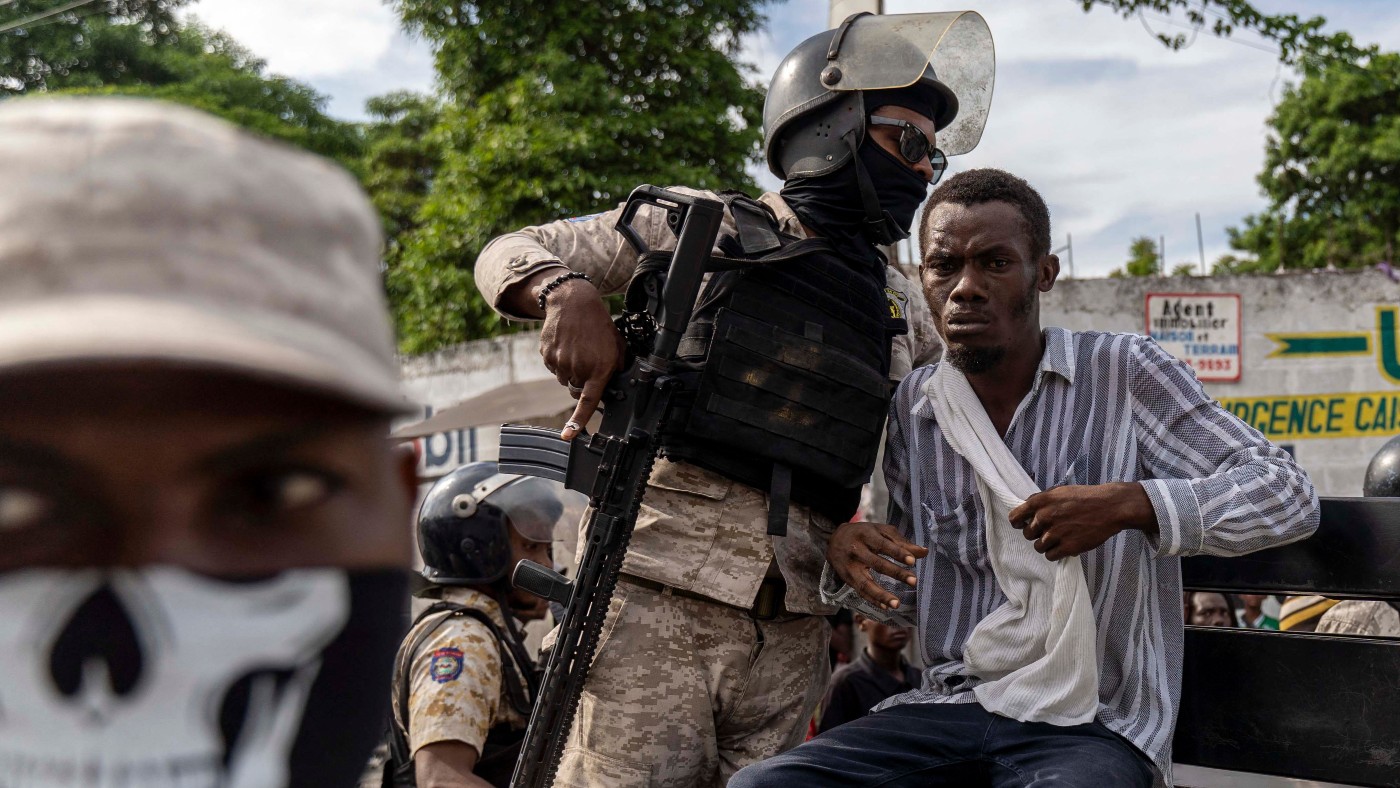Ruled by gangs: how Haiti was taken hostage
Rival gangs of shocking brutality have competed to fill power vacuum left following the assassination of President Moïse

A free daily email with the biggest news stories of the day – and the best features from TheWeek.com
You are now subscribed
Your newsletter sign-up was successful
Haiti is one of the most wretched nations on Earth, said Jacqueline Charles in the Miami Herald. It’s the poorest country in Latin America and its history is steeped in blood. Repressive dictators, political instability and armed conflict have been the norm.
As if that weren’t trial enough, it has suffered a whole series of natural disasters, the worst being the earthquake of 2010. But the assassination last year of its president, Jovenel Moïse, has created a whole new level of terror and chaos. Rival gangs of shocking brutality have competed to fill the power vacuum; violence is everywhere; the nation is on its knees.
‘Police have surrendered control’
What’s happening in Haiti almost defies belief, said Orla Guerin on BBC News. There has been no head of state since Moïse’s assassination, and the “US-backed prime minister, Ariel Henry, is unelected and deeply unpopular”. There isn’t even a functioning parliament, since “gangs control the area around it”. In the capital Port-au-Prince, rubbish has now piled up knee-high in the streets; cholera has made a deadly comeback after a three-year absence; about 4.7 million of Haiti’s 11.5 million population are facing acute hunger.
The Week
Escape your echo chamber. Get the facts behind the news, plus analysis from multiple perspectives.

Sign up for The Week's Free Newsletters
From our morning news briefing to a weekly Good News Newsletter, get the best of The Week delivered directly to your inbox.
From our morning news briefing to a weekly Good News Newsletter, get the best of The Week delivered directly to your inbox.
The level of violence unfolding here is absolutely terrifying, said Roody Edmé in Le National (Port-au-Prince). Understaffed and easily bought off by criminals, police have surrendered control of 60% of the capital to gangs, many of which have close links to politicians. Kidnapping is commonplace – as is murder. Armed groups have set fire to entire neighbourhoods, killing men in their homes, and raping women in front of their children. Few people venture out after dark; those who do are at serious risk of getting caught in shootouts.
‘Wary of foreign intervention’
Needless to say, all this has had a dire effect on the economy, said Frantz Duval in Le Nouvelliste (Port-au-Prince): bread is a luxury because bandits hinder factory production and road distribution; flour is hard to get, petrol even more so. For the past two months, gangs blockaded Haiti’s largest oil terminal, though police have now regained control. Inflation is running at 38.7%.
It was a sign of how “desperate” the situation had become that the Haitian government requested foreign intervention in October, said Natalie Kitroeff in The New York Times. Scarred by their experience in 2010, when UN peacekeepers brought cholera to their country, causing an outbreak in which 10,000 people died, Haitians have grown wary of foreign intervention. Now, however, it’s hard to see how they can continue without it. No sign yet, though, of “boots on the ground”. The US, fearing a surge in mass migration from Haiti, is pushing for a multinational armed force to be sent to the country. Washington has sent some armoured cars to help Haiti’s police, said The Washington Post. But simply paying “lip service” to Haiti’s plight is not good enough. To acquiesce in the status quo “is to be morally complicit in an unfolding humanitarian tragedy”.
A free daily email with the biggest news stories of the day – and the best features from TheWeek.com
-
 Political cartoons for February 15
Political cartoons for February 15Cartoons Sunday's political cartoons include political ventriloquism, Europe in the middle, and more
-
 The broken water companies failing England and Wales
The broken water companies failing England and WalesExplainer With rising bills, deteriorating river health and a lack of investment, regulators face an uphill battle to stabilise the industry
-
 A thrilling foodie city in northern Japan
A thrilling foodie city in northern JapanThe Week Recommends The food scene here is ‘unspoilt’ and ‘fun’
-
 The fall of the generals: China’s military purge
The fall of the generals: China’s military purgeIn the Spotlight Xi Jinping’s extraordinary removal of senior general proves that no-one is safe from anti-corruption drive that has investigated millions
-
 Epstein files topple law CEO, roil UK government
Epstein files topple law CEO, roil UK governmentSpeed Read Peter Mandelson, Britain’s former ambassador to the US, is caught up in the scandal
-
 Iran and US prepare to meet after skirmishes
Iran and US prepare to meet after skirmishesSpeed Read The incident comes amid heightened tensions in the Middle East
-
 Syria’s Kurds: abandoned by their US ally
Syria’s Kurds: abandoned by their US allyTalking Point Ahmed al-Sharaa’s lightning offensive against Syrian Kurdistan belies his promise to respect the country’s ethnic minorities
-
 Israel retrieves final hostage’s body from Gaza
Israel retrieves final hostage’s body from GazaSpeed Read The 24-year-old police officer was killed during the initial Hamas attack
-
 China’s Xi targets top general in growing purge
China’s Xi targets top general in growing purgeSpeed Read Zhang Youxia is being investigated over ‘grave violations’ of the law
-
 Panama and Canada are negotiating over a crucial copper mine
Panama and Canada are negotiating over a crucial copper mineIn the Spotlight Panama is set to make a final decision on the mine this summer
-
 Iran unleashes carnage on its own people
Iran unleashes carnage on its own peopleFeature Demonstrations began in late December as an economic protest